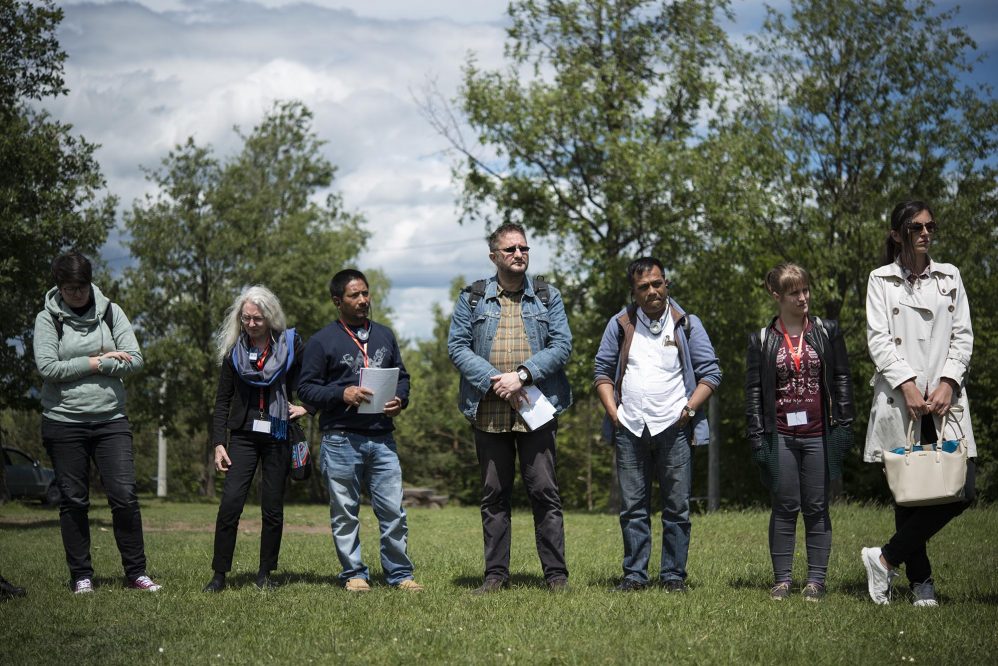The “Reconciling Histories!?” Conference brought together peace and human rights activists, peace work researchers, reporters and historians from various countries with war and postwar experience, ranging from India and Sri Lanka, the Balkans, Ukraine and Georgia, all the way to Western Europe.
The Conference was organised by the Centre for Nonviolent Action Sarajevo/Belgrade from 15 to 17 May in Sarajevo, with a study visit to Zavidovići, a place recognised as an important and positive example in dealing with the past and peacebuilding processes.

The Conference focused on the experience of different countries in the postwar process of seeking justice, its challenges and taboos, the role of historical myths and narratives in the reconcilitaiton process, understanding the importance of nonviolence and its limits. The keynote speakers and moderators included, among others, Edin Ramulić, Diana Francis, Martina Fisher, Budimir Ivanišević, Marina Elbakidze, Albulena Karaga, Ponnampalam Narasingham.
Thirty years since the war, the population of Sri Lanka has been working on building sustainable peace for the past nine years. Ponnampalam Narasingham, a peace activist from Sri Lanka, says that gatherings such as this one are an opportunity to get to know contexts in other countries and the difficulties they face.
“The mechanisms, techniques and tools used by others may be of help to Sri Lanka on the path that it must take,” says Ponnampalam Narasingham.
“The choice of peace and human rights activists, peace work researchers, reporters and historians is not haphazard. It indicates an identified need for linking the fragmented work in this area, or at least bringing its actors into dialogue, because everyone can give significant contribution in their own way to building, or to dismantling peace. This is the task of social reconciliation, the task for wider and diverse social groups is certainly one of the foundations of a successful reconciliation process,” said Nenad Vukosavljević from the Centre for Nonviolent Action Sarajevo/Belgrade, adding that he sees social reconciliation as giving up hatred and prejudice among people who do not know each other personally but generate these feelings based on their belonging to a collective.
“As much as it may seem that reconciliation is a concession to others, who are thus forgiven for something that is unforgivable, peace, justice and security are something all people need and something everyone gains from equally. By being liberated from fear and hatred, we help ourselves, our loved ones, our immediate and our wider environment,” he added.

Natasha Zupan, a peace activist from Germany who spent years working in the Balkans, said that progress on the path of peacebuilding in the Balkans faces great challenges and that a tremendous onus is on the politicians who are often most to blame for halting that process.
“There is, of course, hope. The preconditions for meaningful change do exist. The international community had an important role at the start of this process. Although I am generally against such a role of the international community, I believe certain mechanisms are welcome,” Zupan said.

Researcher Martina Fisher believes that in postwar societies, it is important to discuss the importance of memory and different, often opposing histories.
“Some might say how this topic is not important because there are so many more pressing issues. But in order to move on towards the future, it is important to look back and understand what happened to us. Perhaps it is too early for reconciling histories in the Balkans and other parts of the world, but it is very important for a society to understand that experiences and perspectives of what happened can be different, while at the same time bringing to light facts that are indisputable, such as condemning war crimes and recognising the suffering of victims,” Fisher pointed out.
This Conference was also important for our region in letting us see that we are not alone in the problems we face or in our efforts to find ways to overcome them, we heard from Davorka Turk from the Centre for Nonviolent Action.
“It is also important because a view from the outside can help us see where we falter and where we are successful, so that we can focus our energy in the future to where it is most needed.
The solidarity we feel from people from other parts of the world is also very important in helping us carry on,” she added.
 The photo gallery from this event can be viewed HERE
The photo gallery from this event can be viewed HERE